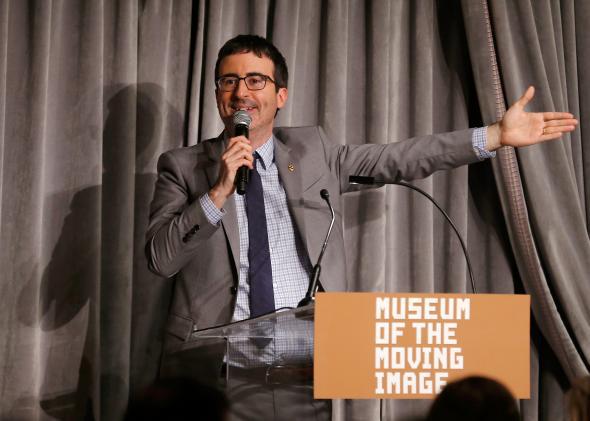Could things be getting slightly better on the diversity front when it comes to the coveted spots in late-night comedy writers’ rooms? Seth Meyers, who has been hosting Late Night With Seth Meyers since February, was interviewed on Monday by BuzzFeed founder Jonah Peretti, and the question of getting people who aren’t white men into comedy writing rooms came up. “So I heard that you made a real effort to hire a diverse writing staff,” Peretti said toward the end of the interview. Meyers has 12 writers, including three women and at least three people of color, one being Amber Ruffin, who is reportedly the first black woman to write for late night network comedy.
“Well, we have a diverse writing staff,” Meyers said, but went on to suggest that it wasn’t really a major effort to get there. “I feel it’s easier and easier to have a diverse writing staff, because the field has diversified. When you look at packs, when you go to see shows, there are more diverse candidates. We have a diverse staff, but we didn’t hire them because of that. We hired them because they made us laugh.”
That answer demonstrates how hard a line it is to walk when talking about diversity in hiring, when all too many people believe that if you have to make an extra effort to hire women and people of color, it’s because they need an “extra” boost when compared with white male candidates. It’s hard to fault Meyers for wanting to shut that presumption down. Plus, he is right that one of the major reasons that women and people of color are underrepresented in comedy writing is the pipeline problem: Too many people who aren’t white men were shut out of improv and standup at a young age, meaning that they had fewer opportunities to develop into the kind of people who get hired to write for late-night TV. If the pipeline is getting better, then it should follow that you start seeing more diversity in writers’ rooms.
While Meyers offers valuable perspective on the question, his answer did overlook the fact that unconscious discrimination continues to play a role when it comes to hiring, with plenty of studies showing that people still tend to favor men and white people, even if they believe themselves to be free of these kinds of prejudices.
Because of this, another late-night host, John Oliver, tried an innovative strategy when hiring writers for his HBO show Last Week Tonight, according to IndieWire. On top of hiring former David Letterman writer Nell Scovell to actively seek out women and encourage them to apply, Oliver and his staff used blind submissions in both rounds of hiring. “Oliver chose to hide the writers’ names from himself, he says, to fight against his own prejudices,” Ingoo Kang of IndieWire writes. The result was a staff with two women out of nine writers.
That two out of nine, or three out of 12 is a sign of improvement reflects how lopsided the field still is. As Kang writes:
Last Week Tonight ended up with two female staffers, Juli Weiner and Jill Twiss, out of a total of nine writers. That 22% figure doesn’t sound like much, but it’s certainly an improvement over other shows. Of the three 2014 Emmy-nominated late-night talk shows, Jon Stewart boasts a 19% female writing staff (3 of 16 writers), Jimmy Fallon a 10% female writing staff (2 of 20 writers), and Stephen Colbert a paltry 5% (only 1 of his 19 writers is a woman).
[Correction, Aug. 13, 2014: Daily Show writer Daniel Radosh informs us that there are actually four female writers out of 14 on Jon Stewart’s staff, which is 29 percent of its writing staff.]
Meyers and Oliver are definitely showing a way forward. Meyers is right that a diverse pipeline can help improve diversity in the writers’ rooms of television, which means standup clubs and improv troupes need to give more opportunities to young comics. And Oliver’s experiment shows that the paucity of the pipeline still means that even blind hiring leads to a mostly male staff. That doesn’t mean he was wrong to do what he could to minimize the effect of unconscious bias, of course. But it also suggests that this problem can’t be fixed solely from the top down and that going after a diverse staff rather than making yourself colorblind might be a more effective route.
So, now we are on our way toward more diversity in the late-night writers’ room. Next step: Diversity in the host’s chair. A girl can dream.
